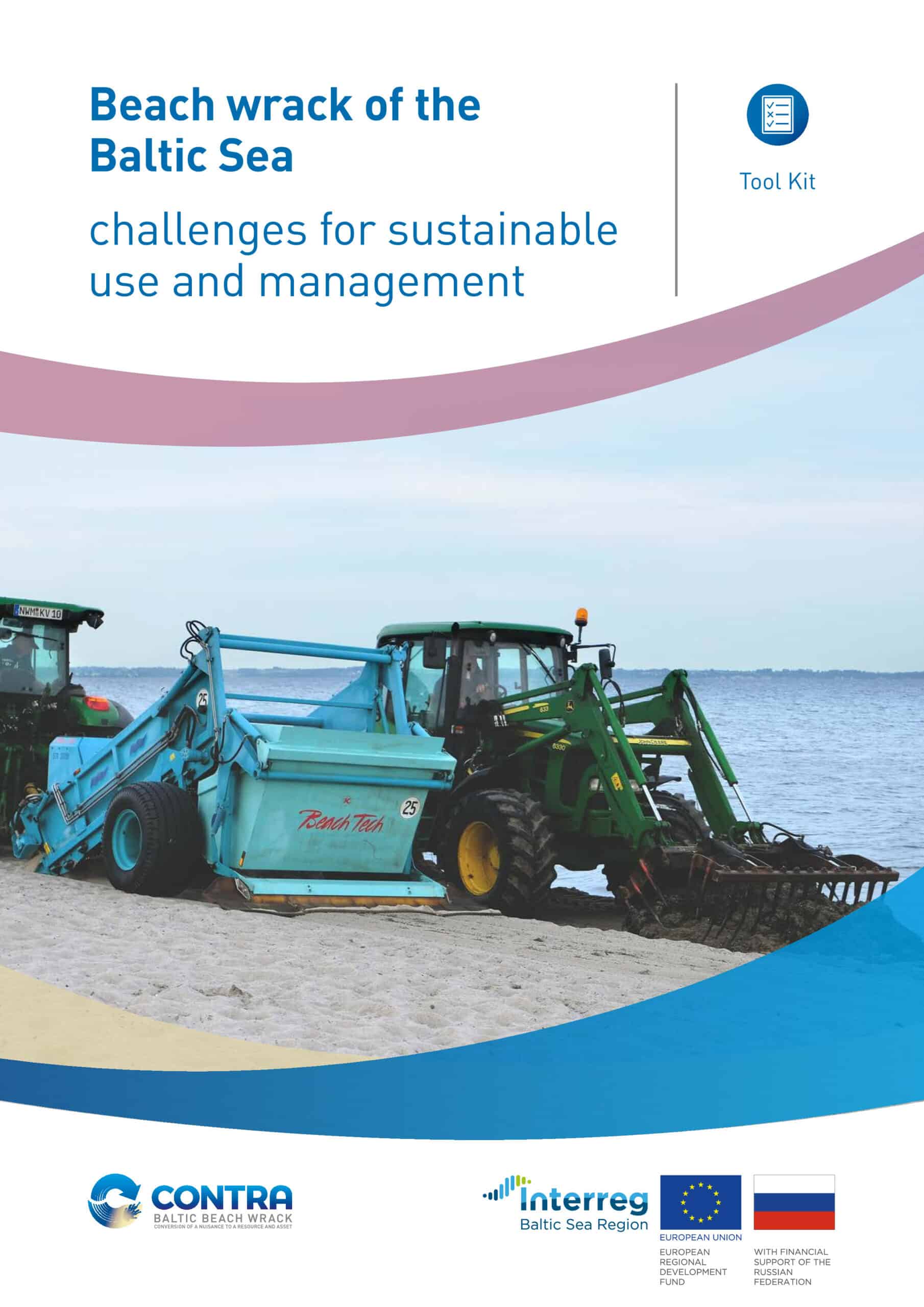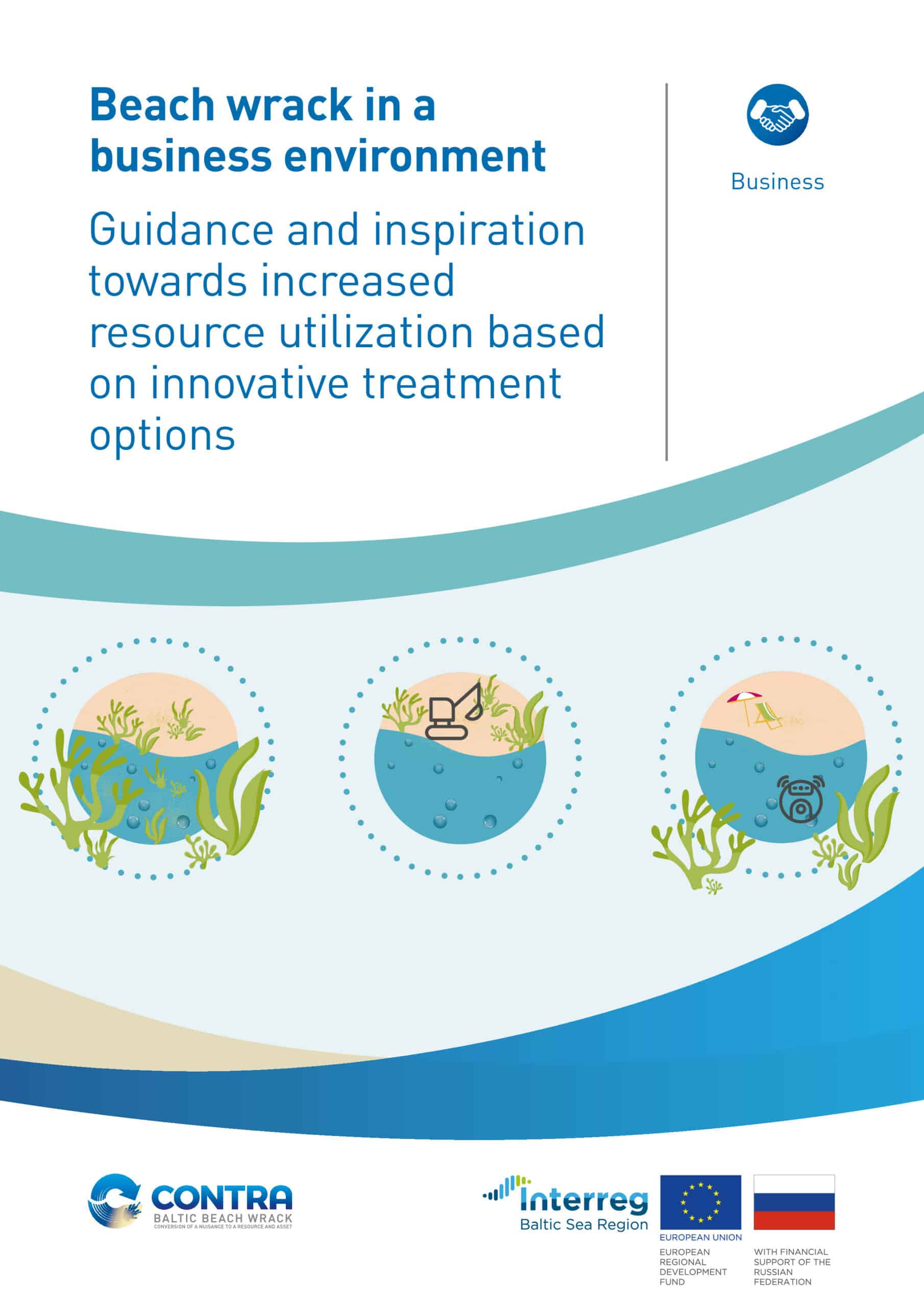CONTRA
Wrack management for clean beaches
Beach wrack is organic material washed ashore, for example, torn off sea grass or brown algae. It can cover Baltic Sea beaches for weeks after storms, rotting and leaking nutrients back into the water. Managing beach wrack is an issue for local authorities and the tourism industry, in particular of the western and southern Baltic Sea. Coastal municipalities did not have helpful tools to deal with beach wrack and to treat it in a sustainable way as part of coastal water management.
Balancing opposing interests and identifying economic opportunities
Previous practices to collect beach wrack usually created a financial burden for local communities. The methods used to collect and dispose of beach wrack, were also often in direct conflict with measures to safeguard the environment. A fair and comprehensive evaluation of all environmental, social and economic aspects of beach wrack management was needed.
Budgets
in numbers
-
2.57MillionTotal
-
1.92MillionErdf
-
0.08MillionEni + Russia
-
0.00MillionNorway
Achievements
New multi-discipline and transnational Beach Wrack Network established
CONTRA built a forum dedicated to the sustainable management of beach wrack in the Baltic Sea region, including collection and treatment, whilst protecting beaches as living, natural landscapes. Its cornerstone is the Beach Wrack Network. The members include local authority representatives, beach managers, landowners, coastal engineers, landscape historians, national political decision-makers, nature conservationists, students and scientists, industry representatives, resource managers, private enterprises, and representatives of the tourism industry. The focus of the network is to act as a support facility for policymakers, environmental groups, public authorities, and marine resource management companies on topics related to beach wrack as well as promote sustainable beach wrack management policies and operations in the region.
Solutions to use beach wrack in a sustainable way
In order to exploit the potential of beach wrack as a valuable resource for bio-based products or services and, at the same time, positively influence the reduction of eutrophication, the project partners implemented several case studies in countries with different management systems: at the islands of Rügen and Poel in Germany, Køge Municipality in Denmark, in Swedish Kalmar and Öland, and in the gulf of Gdansk in Poland. The German case studies demonstrated that beach wrack could be co-composted to produce soil improvement products, and it was suitable for the production of biochar. In the Polish case, beach wrack was treated in a reed bed system to be used as soil conditioner or fertilizer. These experiences collected across the Baltic Sea helped the partners check the applicability of solutions for local authorities and businesses in coastal destinations that rely on beach tourism.
Outputs
Baltic Beach Wrack Toolkit – Challenges for sustainable use and management

Beach wrack in a business environment

Project Stories
Partners
University of Rostock
- TownRostock
- RegionRostock, Kreisfreie Stadt
- CountryGermany
- RepresentativeHendrik Schubert
- Phone
- E-Mail
- Web
Institute of Oceanology of the Polish Academy of Sciences
- TownSopot
- RegionTrójmiejski
- CountryPoland
- RepresentativeLech Kotwicki
- Phone
- E-Mail
- Web
EUCC - Coastal Union Germany
- TownRostock-Warnemünde
- RegionRostock, Kreisfreie Stadt
- CountryGermany
- RepresentativeJane Hoffmann
- Phone
- E-Mail
- Web
KS-VTCtech GmbH
- TownGanderkesee
- RegionOldenburg, Landkreis
- CountryGermany
- RepresentativeTimo Garrels
- Phone
- E-Mail
- Web
Association of Polish Communes Euroregion Baltic
- TownElbląg
- RegionElbląski
- CountryPoland
- RepresentativeMarcin Żuchowski
- Phone
- E-Mail
- Web
Linnaeus University
- TownKalmar
- RegionKalmar län
- CountrySweden
- RepresentativeWilliam Hogland
- Phone
- E-Mail
- Web
Estonian Ministry of Environment
- TownTallinn
- RegionPõhja-Eesti
- CountryEstonia
- RepresentativeKatarina Oganjan
- Phone
- E-Mail
- Web
University of Tartu
- TownTartu
- RegionLõuna-Eesti
- CountryEstonia
- RepresentativeTiia Möller
- Phone
- E-Mail
- Web
Atlantic Branch of Shirshov Institute of Oceanology, RAS
- TownKaliningrad
- RegionKaliningrad Oblast
- Country
- RepresentativeBoris Chubarenko
- Phone
- E-Mail
- Web
University of Southern Denmark
- TownOdense
- RegionFyn
- CountryDenmark
- RepresentativeMarianne Holmer
- Phone
- E-Mail
- Web
Krinova AB
- TownKristianstad
- RegionSkåne län
- CountrySweden
- RepresentativeSara Wanther
- Phone
- E-Mail
- Web
Municipality of Køge
- TownKøge
- RegionØstsjælland
- CountryDenmark
- RepresentativeJacob Nielsen
- Phone
- E-Mail
- Web
Gdańsk University of Technology
- TownGdańsk
- RegionTrójmiejski
- CountryPoland
- RepresentativeMagdalena Gajewska
- Phone
- E-Mail
- Web
Hanseatic Environment CAM GmbH
- TownSandhagen
- RegionMecklenburgische Seenplatte
- CountryGermany
- RepresentativeMartin Staemmler
- Phone
- E-Mail
- Web
-
Project managerHendrik SchubertUniversity of Rostock
-
Legal representativeJan TammUniversity of Rostock
-
Financial managerKatrin ThielUniversity of Rostock
-
Communication managerJane HofmannEUCC - Die Küsten Union Deutschland e.V.



